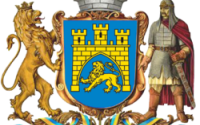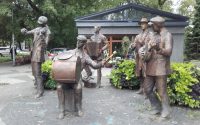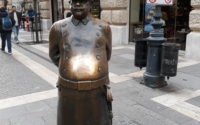1940 ‘No Official Papers!’
My grandmother Joanna Gryzelda Pach (nee de Massilla Moszoro) was born in Vienna in 1899. I have already mentioned in a previous blog that her father was an official in the Austro-Hungarian civil service. As Director of Education for the Galicia he was later transferred to Lwów or Lemberg as it was known before Polish Independence in 1918. Galicia (like it’s Spanish namesake) is an ancient province which today straddles an area stretching from Kraków in the west to beyond Tarnopol in present day Ukraine, the latter being the easternmost extent of the Austro-Hungarian Empire.
My grandmother was of Armenian descent, the Armenians having arrived, settled and assimilated as Polish citizens from around the 11th century. Lwów was one of the main centres of their settlement and they established themselves as a trade link for luxury goods from Asia. Their assimilation progressed to the professions and the gentry. The Moszoro family, in fact the extended family, were Lwów citizens for centuries. Her parents Mikel and Anna (nee Hamerling) bore four other children (one son died during World War 1 on military service in the Austro-Hungarian Army. My own father often referred to his grandmother Anna with the surname von Podbielska which despite sounding Polish was actually Prussian. I have a notion that the surname, officially, was von Podbielska – Hamerling, which is a bit of a mouthful!
It was only through my own research that I discovered that my father’s paternal grandparents were Maksimilian and Pertonella (nee Wojciechowska). My father never mentioned them, only his maternal grandparents and I used to wonder why. It might have been that the were dead by the time my father was born.
My father described his mother, Joanna, as a very talented individual; a qualified dentist and an accomplished musician who would lead the local orchestra wherever they lived, which always meant where his own father, as a Polish Army officer was posted. That life ended abruptly in late summer 1939 with the invasion of Poland by Germany in the west and the USSR in the east. After my father had fled from Poland and his own father was a POW in Germany, the circumstances leading to my grandmother and her daughter Aldona (my aunt) being detained in Siberia were vague, until, upon request, I received information from the authorities in Russia in 2011. According to the Russian records, Joanna, Aldona and another person called Bernard had arrived in Lwów in 1939, which was then under Russian occupation, from Kraków which was under German occupation. Quite why they went to Kraków is a mystery. I can only speculate that perhaps some of my grandfather’s family were there and she was trying to make contact. I had never heard of Bernard until I received the Russian documentation and again I can only speculate that he might have been a nephew of my grandfather. The content of the correspondence from Russia with the translation is as follows:
What the letter states is basically: ‘the family is registered under the number 85732 f.35 of the Sverdlovsk (now named Yekaterinburg) district the herein mentioned family Pach Bernard Francevich born 1908, Armenian, born in Vienna. The family came from Kraków, Poland on 15.10.1939 as refugees from the Polish-German war in Lvov (Russian spelling of Lwów). By the decision of the district jury (probably the local Soviet council occupying Lvov) on 10.06.1940 dispatched from the territory of west Ukraine as a family living with no official papers, without the right to settle.
Pach BF is by profession a professor of music and a director of his own jazz band. Wife Pach Joanna (Anna) Mihailovna born 1900, Armenian, educated in two professions; dentist and music teacher. Daughter Pach Aldona born 1928.
The family was sent to the town of Serov in Sverdlovsk district. In September 1940 the family was still living there in a village called Tesma.
On 29.08.1941 all of the above members of the family on the basis of the Directive Order of the Soviet Union were granted amnesty as citizens of Poland and were allowed to settle freely in Serov.
Any further details of the family after 29.08.1941 are not recorded. A xerox copy of the photo of Pach BF is attached. There are no photos of other family members’.
No Official Papers ! My grandmother must have been livid. She was an officer’s wife, in the higher echelons of Polish society, and according to my father a bit of a snob. The Moszoros had been living in Lwów for centuries. I can almost hear her ‘those damned Bosheviks say I need official papers. Who do they think they’re talking too!’
Why did she say she was married to Bernard? Why did they say Aldona was born in 1928, when in fact it was 1925? Having no official papers probably saved them from death. Stalin had a particular grudge against Lwów, because during the Polish-Bolshevik War, he was the Red Army commissar for the area and the Polish army had routed the Red Army there. This was his revenge, and if Joanna had said she was an officer’s wife, she and Aldona would have been shot, as was happening to all other Polish Army officers and their families. Stalin was ethnically cleansing Lwów of Poles and replacing them with Ukrainians. It makes sense to me, on reflection, that staying alive trumped all other considerations and there would have been safety in numbers. Reducing Aldona’s age from 15 to 12, probably saved her from hard labour or abuse. Who would check? After all they had no official papers.
After Germany invaded USSR and the latter declared war and became an ally against Germany, the Polish government in exile in London negotiated with Stalin for the release of Poles exiled to Siberia with the intention of forming a front to fight the Nazis. They would be under the command of General Władysław Anders, who had been held in Lubyanka Prison in Moscow. They would make their way west, men, women and children – ‘Ander’s Army’ – as they were known, through central Asia, Iran, Iraq and Syria before joining the Second Polish army, or for non-combatants to other civil duties. https://en.wikipedia.org/wiki/W%C5%82adys%C5%82aw_Anders My grandmother was transferred to Southern Rhodesia now Zambia. Aldona died of typhus and is buried in Tashkent in present day Uzbekistan. Efforts to find her exact whereabouts continue to this day through the Red Cross. Bernard died in combat in Italy serving as a soldier in the Second Army.
We have in our possession, letters from my grandmother to my father translated and they make for sad reading. They will be published in next week’s blog.
End


